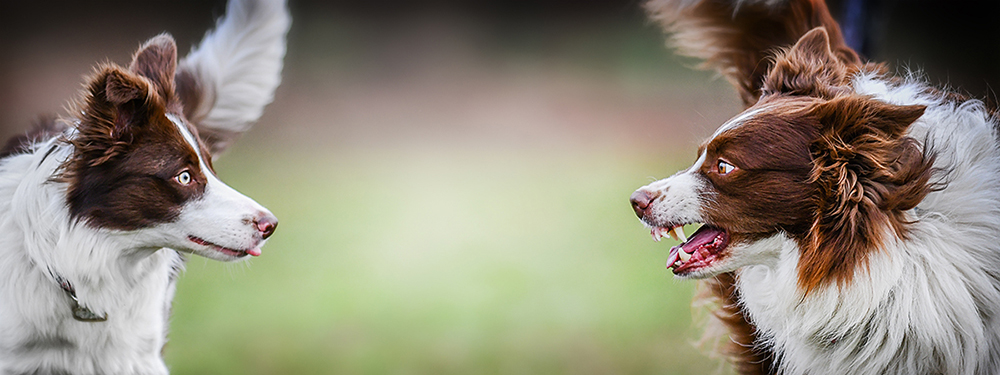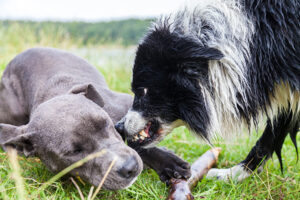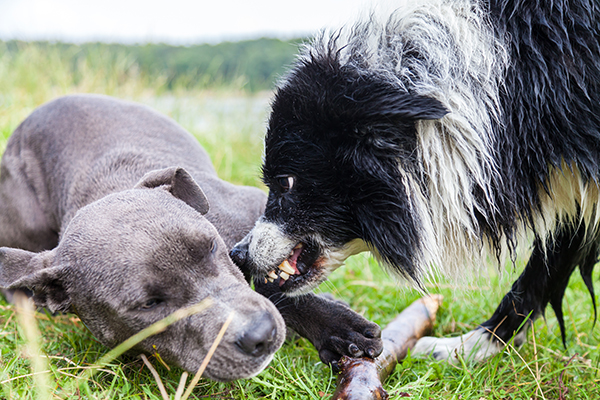
Border collies, on the whole, are not aggressive dogs, but they can very easily become overwhelmed and defensive. They are bred for working on farms, in the peace and quiet of the countryside, in close contact with their owner and a handful of other collies or farm dogs that are generally respectful of each other. Farmers have not had to worry too much about breeding for robust, “bomb-proof” temperaments because border collie aggression towards other dogs is not an issue for them. Therefore, historically, there has not been the selective breeding for highly social temperaments that you may see in other breeds, such as gundogs, who need to be able to work in close proximity to other dogs. Farm-bred border collies don’t always (there are very good exceptions!) have much contact with a variety of other dog breeds as small puppies, and are easily offended and overwhelmed by the over-enthusiastic, aggressive or overtly sexual ways in which different dog breeds may greet them. If you want a dog with an outgoing, friendly temperament, there are some very good agility, other dog sport and pet breeders who socialise their puppies well and breed especially for temperament.
That said, as puppies, all border collies often manage exceptionally well, and very few collie puppies are aggressive. The issues seem to develop later on, at around 6 – 18 months of age, either as a result of being attacked by another dog, due to contact with other over-enthusiastic “pushy” dogs or as the collie hits sexual or social maturity and is no longer so interested in playing.
After looking through the internet searches for border collie aggression problems that people are searching for solutions for, I can see the following search queries, just on the first page of looking

- Border collie suddenly aggressive
- Border collie aggressive towards other dogs
- Border collie snapping at other dogs
- Border collie fear aggression
- Aggressive border collie training
- Reactive border collie
And so on….
So if you have this problem with your collie, you are certainly not alone!
Here’s what to do if you are struggling with border collie aggression towards other dogs:
1. Prevention. Prevent your dog from practising the behaviour. This means that in the short term, walk them in areas away from other dogs, or where other dogs are on leads and can’t jump or over them or bite them, and where you can keep a good distance away from the other dogs.
Remember: the more a dog practises a behaviour, the more that behaviour becomes their set way of behaving in that situation, and the more difficult the behaviour is to change.
2. Ignore anyone who tells you that your dog needs to be castrated. Often, this sort of behaviour is driven by fear, and neutering a dog will mean that the dog loses the confidence-boosting hormone testosterone, which can make the behaviour much worse. I have seen nervous dogs (and bitches whose hormones can also be adversely affected by spaying) becoming aggressive after they have been neutered. Don’t do it, even if your vet advises it. Talk to a behaviourist first!
3. Also avoid looking on the internet for “quick fix, suitable-for-all” solutions. Without knowing a lot of extra information about YOUR collie and YOUR circumstances, any of these sorts of training methods can make the situation worse, weaken the relationship between you and your dog and waste time trying things that may not work before you get the help you really need.
4. Contact a behaviourist. The sooner you can do this the better, ideally as soon as the aggression starts happening, and ideally with a border collie specialist. If this isn’t dealt with straight away, it can be very difficult to resolve.
What happens once I find a behaviourist?
Once you have contacted a behaviourist for border collie aggression, they will work with you to investigate why your collie is behaving the way he or she is. There are lots of reasons why they could be feeling the need to be aggressive. We can only start to help with the aggression once we know why the dog is behaving in the way it is.
These are some of the emotions that your aggressive border collie could be feeling that can result in aggressive behaviour:
1. Fear
By far the most common reason that collies are aggressive is due to fear, as described above.
2. Frustration.
Your dog may be driven by frustration. A dog can feel frustrated when other dogs:
• Approach and invade what the dog perceives to be “his” or “her” personal space, Approach the dog’s own territory
• Get too close to his or her owner
• Get too close to his food or toys.
It could also be driven by the dogs being frustrated that they can’t get to the other dog to say hello as quickly as they would like to, and they may not actually be aggressive at all, they just sound like they are!
3. Sexual tension
It may also be caused by sexual tension, most commonly observed between adolescent dogs when they start to reach sexual maturity. In these cases, your dog may be aggressive towards other male entire dogs but be fine with females.
Females can also start to change their attitudes towards other dogs upon reaching sexual maturity, often deciding that they don’t really want to interact with other dogs much at all, and having to use snapping or snarling to keep other dogs at a distance.
4. Pain or discomfort
Your collie may also be aggressive towards other dogs due to pain or discomfort. Play with other dogs, or the natural interest/apprehension that dogs feel when they meet another dog, can cause certain muscles and areas of the body to tense up. This can cause discomfort or pain. The dogs don’t understand that it hurts because they are tensing up – they just associate the pain with other dogs and start to use their body language to warn other dogs to keep away.
5. Prey drive
Larger dogs (rare with collies) might be barking or lunging at smaller dogs, mistakenly seeing them as prey.
6. Dislike
Even more rarely, some dogs just don’t like the look of another dog for no particular reason, just the same as we dislike some people.
Finally…
With all these reasons why your dog could be behaving aggressively towards other dogs, hopefully you can understand why it’s important to find a behaviourist who will be able to determine the cause of the behaviour. It is only once you have identified the cause, that we can effectively start to help the dog to feel a different emotional reaction when meeting other dogs and teach them different ways of behaving.
For help or a quick chat, please contact me on 07931 409307. Please note, however, that it is difficult to give quick, effective advice over the phone without going into more detail for reasons outlined in this article!

